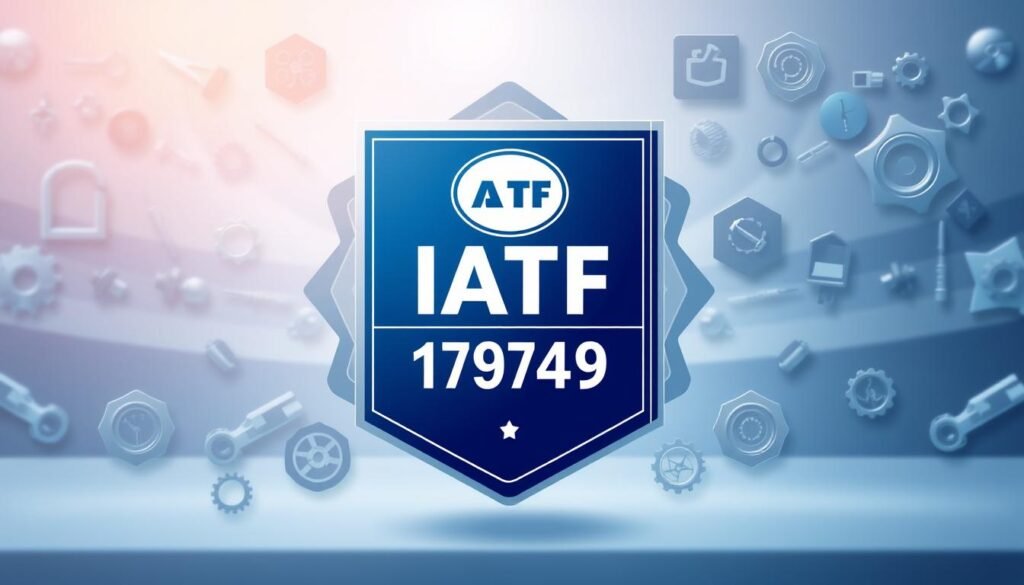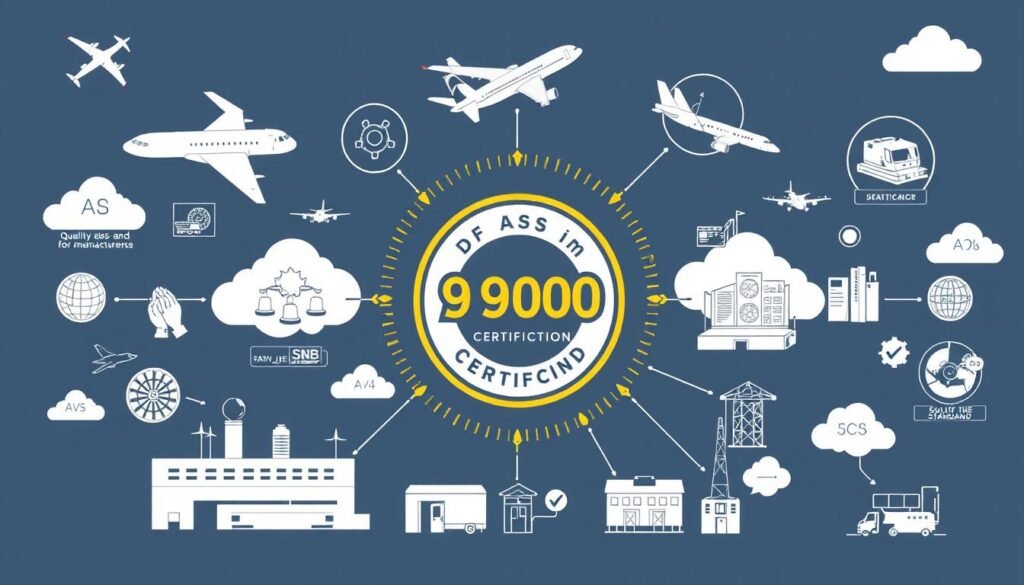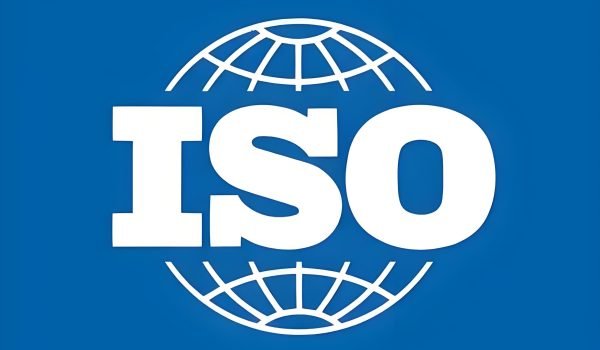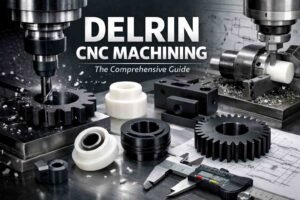You might be surprised to know that over 25,000 international standards have been published by the International Organization for Standardization (ISO) since its inception in 1947. These standards cover a wide range of technologies and manufacturing processes, ensuring a certain level of quality and consistency across industries.
Industry-specific certifications like IATF 16949 for automotive, AS 9100 for aerospace, and ISO 13485 for medical devices build upon the foundation of quality management standards. These certifications serve as a benchmark for organizations to demonstrate their commitment to quality and continuous improvement. By obtaining these certifications, companies can ensure they meet the stringent requirements of their respective industries, thereby guaranteeing unrivaled quality.
Understanding ISO Certifications and Their Importance
In the realm of international trade, ISO certifications serve as a universal language of quality. These certifications are not just a mark of excellence; they are a guarantee that your products or services meet the highest standards of quality, safety, and efficiency.

What Are ISO Certifications?
ISO certifications are internationally recognized standards that establish requirements, specifications, and guidelines for products, services, and systems. They are developed by the International Organization for Standardization (ISO) to ensure quality, safety, and efficiency across industries. By obtaining an ISO certification, organizations demonstrate their commitment to quality management systems and adherence to international standards.
The Role of the International Organization for Standardization
The International Organization for Standardization (ISO) is an independent, non-governmental organization that develops and publishes international standards. ISO’s Committee on Conformity Assessment (CASCO) produces standards related to the certification process, used by certification bodies worldwide. ISO’s role is crucial in creating a common language for quality across global supply chains, facilitating international trade and cooperation.
Why Quality Certifications Matter in Manufacturing
Quality certifications, such as ISO 9001, are vital in manufacturing as they improve processes, reduce waste, and enhance customer confidence. By implementing a quality management system, organizations can ensure consistent quality across their products and services. This not only benefits the organization but also creates a common language for quality across global supply chains, making it easier for businesses to work together across borders.
The Foundation: ISO 9001 Quality Management System
At the heart of quality management lies the ISO 9001 standard, a foundational framework that helps organizations enhance their efficiency and customer satisfaction. ISO 9001 sets out the requirements for a quality management system, enabling businesses to demonstrate their ability to consistently provide products and services that meet customer and regulatory requirements.
Core Principles of ISO 9001
The ISO 9001 standard is built around several core principles, including customer focus, leadership, engagement of people, process approach, improvement, evidence-based decision making, and relationship management. These principles work together to ensure that an organization’s quality management system is comprehensive and effective. By adopting these principles, organizations can improve their overall performance and achieve sustained success.
Benefits of ISO 9001 Implementation
Implementing ISO 9001 brings numerous benefits, including improved product quality, increased customer satisfaction, and more efficient operations. By achieving ISO 9001 certification, organizations demonstrate their commitment to quality management and show customers that they have a systematic approach to ensuring quality. This certification can also lead to reduced costs through improved efficiency and fewer defects or non-conformities.
Moreover, ISO 9001 serves as the foundation for more specialized industry standards, making it a crucial step towards achieving other certifications such as IATF 16949, AS 9100, and ISO 13485. By establishing a robust quality management system based on ISO 9001, organizations can improve their overall quality and be better positioned to meet the specific requirements of their industry.
IATF 16949: Excellence in Automotive Quality Standards
IATF 16949 is revolutionizing the automotive industry with its stringent quality management standards. As a professional in the automotive sector, you’re likely aware of the importance of maintaining high-quality products and processes. IATF 16949 certification is now a critical benchmark for automotive manufacturers seeking to excel in quality.

Evolution from ISO/TS 16949 to IATF 16949
The transition from ISO/TS 16949 to IATF 16949 marked a significant shift in the automotive industry’s approach to quality management. IATF 16949 was developed by the International Automotive Task Force (IATF) to address the evolving needs of the industry, providing a more robust and effective quality management system.
Key Requirements and Unique Features
IATF 16949 includes several key requirements and unique features that set it apart from other quality management standards. These include an enhanced focus on risk management, embedded software controls, and product safety considerations specific to automotive manufacturing. Additionally, IATF 16949 incorporates error-proofing methodologies, warranty management processes, and supplier quality management requirements.
How IATF 16949 Elevates Automotive Manufacturing
By achieving IATF 16949 certification, automotive manufacturers can significantly elevate their production processes. This certification helps reduce variation and waste while ensuring consistent quality. It also enables manufacturers to gain access to global automotive supply chains and build stronger relationships with Original Equipment Manufacturers (OEMs). Furthermore, IATF 16949 promotes continuous improvement methodologies, including statistical process control and advanced product quality planning.
AS 9100: Meeting Aerospace Industry’s Rigorous Standards
With its roots in ISO 9001, AS 9100 has evolved to cater specifically to the aerospace industry’s rigorous quality and safety demands. This standard is part of the AS 9100 series, which includes AS 9110 for maintenance organizations and AS 9120 for stockist distributors.

The AS 9100 Series Explained
The AS 9100 series was developed to address the unique quality and safety requirements of the aerospace industry. AS 9100, in particular, focuses on design, development, and production, ensuring that aerospace manufacturers meet stringent standards.
Critical Requirements for Aerospace Suppliers
Aerospace suppliers must adhere to critical requirements, including enhanced traceability, configuration management, and first article inspection processes. These requirements help prevent counterfeit parts and ensure product safety.
Risk Management and Product Safety Focus
AS 9100 places a strong emphasis on risk management, helping aerospace manufacturers identify and mitigate potential failures before they occur. This focus on risk management, combined with a commitment to product safety, directly contributes to the exceptional safety record of the aerospace industry.
By obtaining AS 9100 certification, organizations demonstrate their commitment to quality and safety, often a prerequisite for doing business with major aerospace OEMs and government agencies. The standard’s special process requirements ensure consistent quality in critical aerospace manufacturing operations.
ISO 13485: Ensuring Medical Device Quality and Safety
Ensuring the quality and safety of medical devices is paramount, and ISO 13485 provides a framework for achieving this. ISO 13485 is an international standard that specifies requirements for a quality management system where an organization needs to demonstrate its ability to provide medical devices and related services that consistently meet customer and applicable regulatory requirements.
Specialized Requirements for Medical Device Manufacturers
Medical device manufacturers must adhere to specialized requirements outlined in ISO 13485, including an enhanced focus on sterility, biocompatibility, and design controls. These requirements help manufacturers address the unique challenges of medical device production, such as maintaining sterile manufacturing environments and ensuring device efficacy. By following these guidelines, manufacturers can ensure their products are safe and effective for use.
Regulatory Compliance and Documentation
ISO 13485 places significant emphasis on regulatory compliance and extensive documentation. The standard requires manufacturers to maintain detailed records throughout the product lifecycle, supporting traceability and compliance with regulatory requirements. This not only helps manufacturers navigate complex regulatory landscapes across different global markets but also demonstrates their commitment to quality and safety.
Patient Safety and Risk Management
A key aspect of ISO 13485 is its focus on patient safety and risk management. The standard’s risk management approach helps manufacturers identify and mitigate potential hazards to patient safety before products reach the market. Additionally, ISO 13485’s post-market surveillance requirements ensure ongoing product safety and continuous improvement, further safeguarding patient health.
By achieving ISO 13485 certification, medical device manufacturers demonstrate their commitment to meeting the highest standards of quality and safety. This certification is a mark of excellence, reassuring customers and regulatory bodies alike of the manufacturer’s dedication to producing safe and effective medical devices.
Tangible Benefits of Certification for Customers
The value of iso certification extends far beyond the certification itself, offering tangible benefits to customers across various industries. When organizations obtain certifications such as IATF 16949, AS 9100, or ISO 13485, they demonstrate a commitment to quality that resonates throughout their operations.
Certified quality management systems translate into several key benefits for customers. These benefits are not just theoretical; they are practical advantages that impact your business directly.
Consistent Quality Across Products and Services
One of the primary benefits you enjoy when working with certified suppliers is the assurance of consistent quality. Certifications require organizations to implement standardized processes and undergo regular audits, ensuring that products and services meet high standards consistently.
Risk Reduction and Compliance Assurance
Working with certified suppliers reduces risks for you by providing assurance that robust quality controls are in place. This is particularly important in highly regulated industries like automotive, aerospace, and medical devices, where compliance is not just beneficial but mandatory.
Enhanced Traceability and Problem Resolution
Certified quality management systems enhance traceability throughout the supply chain. This means that when issues arise, they can be identified and resolved quickly, minimizing disruptions to your business. The structured corrective and preventive action processes that come with certification further streamline problem resolution.
By choosing certified suppliers, you benefit from a common language and set of expectations that facilitate clearer communication. Moreover, certification requirements drive innovation and continuous improvement, ultimately resulting in better products and services for you. Certifications also provide an objective way for you to evaluate and compare potential suppliers based on their quality management capabilities.
Conclusion: How Fecision’s Certifications Deliver Unmatched Quality Assurance
With a robust set of certifications, Fecision ensures unrivaled quality assurance. Our multiple certifications, including ISO 9001, IATF 16949, AS 9100, and ISO 13485, demonstrate our comprehensive commitment to quality across diverse industries. This positions us as a versatile manufacturing partner capable of meeting the needs of automotive, aerospace, and medical device companies.
Fecision’s certified quality management systems create a competitive advantage through consistent quality, reduced risk, and regulatory compliance. Our investment in obtaining and maintaining these certifications reflects our dedication to excellence and continuous improvement. By serving as a one-stop manufacturing partner, we can provide you with confidence that the products will be manufactured to the exact specifications required by your industry. Let’s partner with Fecision today!




